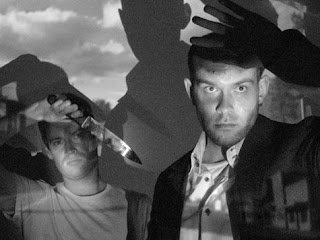kyle horton and chris fassbender
I will preface this review by saying that I don’t like being terrified or terrorized in the theatre. It fills me with tension and agitation as I wait in agony for any gunfire promised on a warning sign on the door of the play I am about to see. I will curl up in a ball and cover my face with the hood of my sweatshirt if I anticipate that something spooky or particularly horrific is about to pop out to startle me. In short: I am a wimp. However, at the same time, I appreciate wholeheartedly how rare it is for the theatre to truly elicit such strong and genuine feelings of horror and terror in its audience and I greet my own discomfort as a triumph for the playwright, the director and the actors of the piece.
With that being said, I spent the majority of Marty Chan’s The Bone House, produced by Village Theatre (Edmonton) in conjunction with Eastern Front Theatre at the SuperNova Theatre Festival in Halifax, wanting the play to be over. Marty Chan’s show is more of a theatrical experiment than a play, as it does not have a clearly defined story. Instead, it is structured as a lecture on serial killers lead by the Mind Hunter Eugene Crawley and his diffident assistant Jacob, in which these characters actively involve the audience and draw the theatre into their world, blurring the lines between theatricality and reality and scripted text and real life conversation.
Beyond its penchant for utter creepiness, The Bone House also raises insightful questions about our fascination with murder, violence and sadism and our inclination to mythologize iconic serial killers such as Ted Bundy and Jack the Ripper. We are fascinated by these “monsters of society” because we are desperately attempting to understand them, to explain how their brains work and why they behave the way they do. Yet, this play asks us why we are so adamant in our desire to understand? Are we attempting to learn how to recognize these killing machines earlier or are we simply searching for evidence that separates us from them, that proves our own superiority? What does it say about our society that we are so quick to demonize a murderous man, yet so fascinated by the chaos, mutilation and destruction he creates? With our societal propensity for creating media circuses that turn criminals into celebrities, have we simply become the audience for whom the serial killer feels compelled to perform? What responsibility and consequences do we face for watching?
Chris Fassbender is the ultimate in creepiness as Eugene Crawley, a Southern “mind hunter” who evokes a distinct feeling of uneasiness despite his attempt at affability and awkward charm. His quick temper is revealed in flashes and his obsession with murder, even in its most psychological and academic forms, seems instantly suspicious and both compulsive and excessive. Kyle Horton is more meek and submissive as Jacob, but he proves just as disturbing as he prowls around the audience and appears to have complete control over all the lights in the room. Tracey Power makes a brief, but memorable, appearance into the fray as “Gabrielle” who is brought in to describe how she witnessed the carnage of her parents’ murders by Crawley’s newest killer “Midnight Cowboy” who is still at large. Power gives a very emotional performance without slipping into a caricature from a bad slasher film.
The audience does not know who to trust and the theatre vividly takes on the ambiance of an extremely dangerous environment. Fassbender and Horton move the audience around to further isolate them from their friends and their comfort zones and at one point they are left in pitch blackness. It is interesting to realize that often silence is more terrifying than perhaps anything else, and that the anticipation and the endless possibility for the imminent calamity can be seen as torturous.
The Bone House was not an easy show for me to sit through, but it does have its own distinct ability to be exhilarating. It is impressively visceral in its ability to have a profound impact on its audience’s bodily reactions, while being smart and, ultimately, reminding us how vulnerable and trusting humans can be and yet how strange and paradoxical we are as well. We could have left the theatre at any time, as Eugene Crawley reminds us thrice, we could have chosen to remove ourselves from the unpleasant and potentially dangerous situation. Why didn’t we leave? Why did we have to stay? Why did we need to watch?
I caught this play on its closing performance May 2nd, 2010 at the Neptune Theatre Studio Theatre in Halifax.






 World Theatre Day: My God Is It Ever The Time to Invest in Canadian Plays
World Theatre Day: My God Is It Ever The Time to Invest in Canadian Plays 